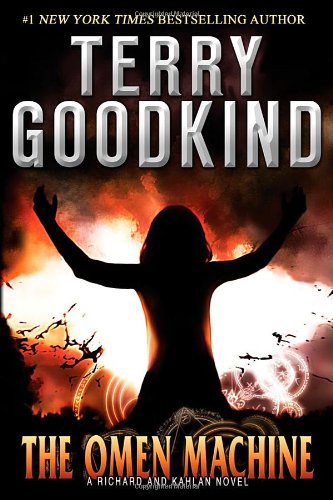 Eight years ago, I declared myself free from a hell of my own making. Eight years is a long time, you know? Not as good as getting a ten year chip, but pretty impressive nonetheless, right? Don’t worry, I’m not buying it either.
Eight years ago, I declared myself free from a hell of my own making. Eight years is a long time, you know? Not as good as getting a ten year chip, but pretty impressive nonetheless, right? Don’t worry, I’m not buying it either.
Yeah, I’ve done something horrible. I thought I was hate-reading, and it would be entertaining after the fact. But instead… yeah, there will be spoilers everywhere. I do this so you don’t have to even though you never would have, purely because I am stupid. Learn from Observe my mistake, and laugh well.
What happened was, Goodkind wrote more books even though the series was over. And I eventually (a long time ago, really) bought the first one. We’ll never know why, I’m sure. The Omen Machine picks up very soon after the series ended, with a purpose other than objectivism, unexpectedly! Would that I could say it was a purpose other than screeds, though. See, there’s some dude with a bone to pick[1], and via means that are not at this time particularly clear, he starts seeding minor, clear as day prophecies all over the place. Then Richard Rahl[2] spends hundreds of pages arguing with his subject nobles individually and in groups, or sometimes with his friends instead, about how nobody should pay attention to prophecy in the first place, but they all (well, his friends less so) keep insisting, “but we waaaaaaana!”, so while never changing his initial opinion, he also argues that at the very least, leave prophecy to the people who understand it, that is to say him and his friends.
I mean, nobody could have interest in all of this back and forth in the first place, but it’s really critical to note that Ayn Rand’s most commercially successful disciple is making even a partial argument from authority that his pissy strawmen should stop choosing for themselves and let the government take care of it.
Also, your faithful reviewer adds as an aside, there’s a really cool AI in the basement that can see the future and is struggling with the whys and wherefores of its existence. I am really disappointed the book couldn’t have been about that instead, you know? But that’s what Goodkind does. He takes the kernel of a good idea, and plants it in a sea of shit. Which I suppose is how gardening is supposed to work, but not everyone who understand the principles of gardening has a green thumb.[3]
[1] Who we meet for a hot minute in the middle of the book, never to return. Because, God help me, there are more books.
[2] The main character of the series, you may recall.
[3] Nice try, metaphor. Thought you were going to escape me, didn’t you?